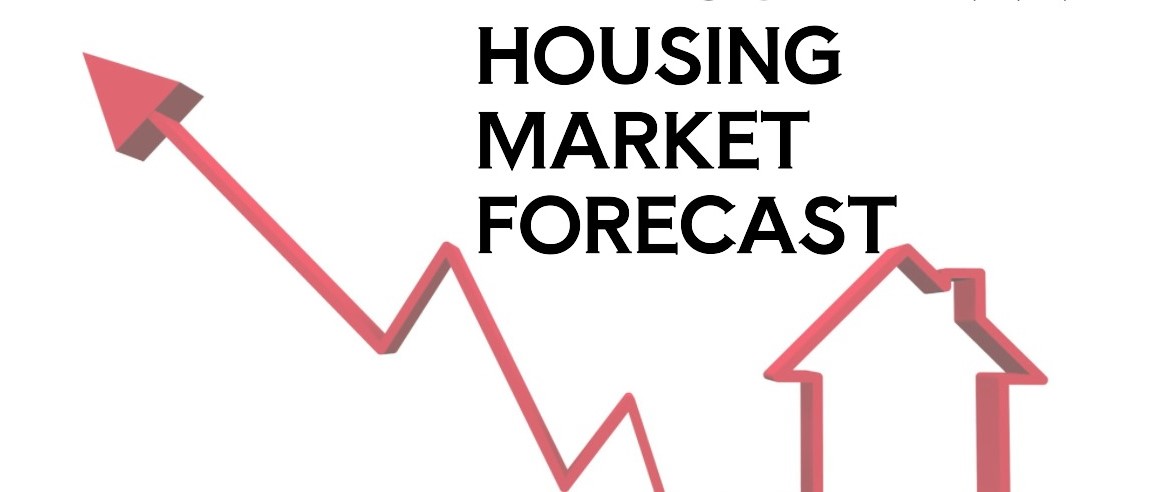Bust Or Boom? The 2024 Housing Market Forecast You Need To Read
Uncertain 2024 Housing Market? Get ahead of the curve with our actionable housing market forecast. Prices, trends, & strategies - all in one read.
Author:James PierceReviewer:Alberto ThompsonJan 05, 202483 Shares41.2K Views

In the context of the housing market forecast, with housing prices at historically high levels and a persistently tight inventory, many potential sellers and eager buyers are experiencing apprehension about the current real estate market. As of November 2023, the median sale price for existing homes in the United States stood at $387,600, marking the fifth consecutive month of year-over-year price increases. Furthermore, the average 30-year mortgage rate, which surpassed 8 percent in October, settled at 6.88 percent by late December 2023 — still higher than the locked-in rates of most homeowners but offering relief from the recent 20-year highs.
The dynamics of home prices, mortgage rates, and available inventory will collectively influence housing affordability in the upcoming year. If you're curious about the potential directions of these trends, continue reading to discover what industry experts anticipate for the 2024 housing market.
Housing Market Forecast For 2024
Looking ahead to the housing market forecast for 2024, the preceding year proved disheartening for many prospective homebuyers. Mortgage rates soared, reaching a peak of 7.79%, and median home prices surpassed $400,000 in the third quarter. Additionally, July witnessed record-breaking average monthly payments at $2,306, as reported by Intercontinental Exchange, a financial technology and data services provider.
Nevertheless, 2024 holds potential for improved conditions for some individuals looking to purchase a home. Although home prices are expected to remain high, and certain markets may see further increases, experts anticipate a softening of prices in specific regions across the country.
Optimism arises from economists' beliefs that the Federal Reserve has concluded its campaign to raise rates and combat inflation. This sentiment followed the decision to keep the federal funds rate unchanged for a third consecutive meeting on December 13. The federal funds rate, a benchmark interest rate influencing mortgage rates indirectly, is expected to stabilize.
However, affordability challenges will persist in 2024. The combination of pent-up demand and limited inventory is likely to bolster prices overall, and elevated mortgage rates will persist until the Federal Reserve implements reductions to the federal funds rate.
Mark Fleming, Chief Economist at First American Financial Corporation, envisions a "flat stretch" ahead for the housing market. Describing the 2023 market as potentially too cold following the prior hot market in 2020-2021, Fleming suggests that 2024 may not yet strike the right balance.
Anticipating The Bounce Back Of The Housing Market
According to Gumbinger, several conditions must materialize for a housing recovery.
"To achieve the most favorable outcome, a substantial increase in the inventories of homes for sale is essential," Gumbinger explains. "This added inventory would alleviate the upward pressure on home prices, stabilizing them or potentially causing them to retreat somewhat from their peak or near-peak levels."
Additionally, a moderation in interest rates is crucial.
However, Gumbinger advises against hoping for an overly swift cooling of rates. A rapid decline in rates might trigger a surge in demand that could offset any gains in inventory, leading to a rebound in home prices.
"It's preferable that rate reductions occur at a measured pace, gradually enhancing buyer opportunities over an extended period, rather than all at once," Gumbinger suggests.
He also notes that a return of mortgage rates to a more "normal" range in the upper 4% to lower 5% bracket would contribute to the housing market gradually reverting to the levels seen between 2014 and 2019. Nevertheless, Gumbinger anticipates that it may take a considerable amount of time before such rates are realized."
Mortgage Originations Expected To Stay Low Through 2024
Dramatically high mortgage rates over the past few years have resulted in a sharp decline in mortgage applications. The positive development is that rates have started to decline in recent weeks.
Despite ongoing subdued application activity, the Mortgage Bankers Association (MBA)interprets this as the low point, forecasting a rise in total mortgage origination volume from an expected $1.64 trillion in 2023 to $1.95 trillion next year, as rates gradually approach 6% by the close of 2024.
Fannie Mae also anticipates an upward trend in mortgage activity, with single-family mortgage originations experiencing a slow but meaningful recovery in 2024, as outlined in a recent report.
Housing Inventory Projection For 2024
Due to many homeowners being 'locked in' at low interest rates or reluctant to sell amid elevated home prices, demand continues to surpass the availability of housing—and is likely to persist for an extended period.
Rick Sharga, the founder and CEO of CJ Patrick Company, a market intelligence and business advisory firm, states, "I don't anticipate a significant rise in the supply of existing homes for sale until mortgage rates return to the low 5% range, which may not happen in 2024."
The housing stock remains close to historic lows, particularly in entry-level categories, sustaining robust demand and sustaining exceptionally high home prices.
Despite these challenges, there are encouraging indicators.
The outlook for home builders, which had been on a decline, is now improving with decreasing mortgage rates and more favorable building conditions.
In December, the National Association of Home Builders (NAHB)/Wells Fargo Housing Market Index (HMI), a gauge of builder sentiment, increased from 34 to 37. A reading of 50 or higher indicates that more builders foresee favorable conditions for new construction.
Simultaneously, new single-family building permits inched up slightly in November, marking the 10th consecutive monthly increase, as per the latest data from the U.S. Census Bureau and U.S. Department of Housing and Urban Development.
Current Trends In The Real Estate Market
Resurgence In Existing-Home Sales Sparks Speculation
Despite persistently high mortgage rates, escalating home prices, and a limited housing inventory, existing-home sales experienced a modest and unexpected rebound in November.
Following a 4.1% decline in October, existing-home sales saw a 0.8% uptick in November, breaking a streak of five consecutive months of decreases, as reported in the latest monthly data by the National Association of Realtors (NAR). On a year-over-year basis, transactions declined by 7.3%, marking the smallest annual decrease since April 2022, according to Realtor.com.
These completed transactions likely occurred in the two months leading up to November when the average 30-year fixed mortgage rate reached levels not witnessed in over two decades, suggesting that prospective homebuyers may be adapting to the higher rates.
While the sales activity remains relatively subdued, experts suggest that this upturn could signal the beginning of a positive shift in 2024.
Dr. Lisa Sturtevant, Chief Economist at BrightMLS, commented, "Falling rates will attract both more buyers and sellers to the housing market." BrightMLS anticipates existing home sales to reach 4.6 million in 2024, up from an expected 4.1 million in 2023, with inventory projected to increase by approximately 8% by the year's end.
Meanwhile, the persistently low resale inventory decreased by 1.7%, leaving the existing home stock at a meager 3.5-month supply at the current sales pace. Many experts argue that a balanced housing market typically maintains four to six months of inventory.
Disheartened Prospective Home Buyers Anticipate Limited Affordability Relief In 2024
Those looking to enter the housing market today should brace for a stark reality: Zillow suggests that current home prices are a staggering 40% higher than they were in February 2020. The National Association of Realtors (NAR) reveals that, in the third quarter of 2023 alone, home prices experienced year-over-year growth in over 80% of U.S. metro areas.
With soaring home prices and mortgage rates hovering in the high-6% range amidst persistent inflation, it's no surprise that the latest Fannie Mae Home Purchase Sentiment Index (HPSI) sets a new record, with 86% of consumers expressing the need to postpone their home-buying plans.
Doug Duncan, Senior Vice President and Chief Economist at Fannie Mae, notes, “Over the past year, the HPSI has plateaued at a low level, signaling enduring consumer pessimism about the housing market's state. Even if mortgage rates decline over the next year, as we currently anticipate, it's unlikely to significantly impact affordability.”
Other indicators also suggest that while home affordability may see some improvement in the coming year, it may still remain elusive for many in 2024.
First-time homebuyers aiming for more affordable properties are facing particularly challenging conditions, as per NAR. The association's First-Time Homebuyer Affordability Index for the preliminary third quarter dropped to 61.9, compared to 65.4 in the second quarter. A reading of 100 indicates that a family earning a median income qualifies precisely for a mortgage to afford a typical home.
Furthermore, a Redfin report notes that the median monthly housing payment reached an all-time high of $2,715 in 2023, marking a 12.6% increase from 2022. This led Redfin to label 2023 as the least affordable year on record for homebuyers. Lenders generally recommend that monthly mortgage payments should not exceed 30% of pre-tax income.
Unveiling The Future Of Real Estate In 2024
Is A Housing Market Crash Likely In 2024
While certain regions are experiencing declines in home prices, the prospect of a housing market crash—characterized by a sudden and substantial drop in home values due to diminished demand—remains low. Experts emphasize that current homeowners are in a much more stable position compared to those emerging from the 2008 financial crisis, with a significant number of borrowers holding positive home equity.
Orphe Divounguy, Senior Macroeconomist at Zillow Home Loans, highlights the surprising resilience of housing competition despite mortgage rates reaching levels not witnessed in over two decades.
"In 2024, I anticipate a slowdown in home appreciation, but not a drastic plummet," notes Divounguy, particularly considering the ongoing inventory constraints. Most experts predict that the supply will continue to be limited for the foreseeable future.
Divounguy also points out several factors, such as Millennials entering their prime home-buying years, wage growth, and financial wealth, acting as positive forces sustaining housing demand in 2024.
However, despite these factors, Dan Hnatkovskyy, Co-founder and CEO of NewHomesMate, a platform for new construction homes, acknowledges the potential for a price collapse, especially in markets where real estate investors have accumulated numerous properties.
"If something were to push the market over the edge, the consequences could be severe," warns Hnatkovskyy in a statement via email.
Anticipating Foreclosure Trends In 2024
While there has been a national increase in foreclosure activity, experts generally do not foresee a significant surge in foreclosures in the coming year.
"As we approach the end of 2023, foreclosure activity is still only at around 60% of pre-pandemic levels and is not expected to return to 2019 figures until sometime in the mid-to-late part of 2024," explains Sharga.
This optimism is primarily attributed to the robust state of the economy, characterized by low unemployment rates and consistent wage growth. Additionally, the high quality of loans and the availability of expanded financial relief options from mortgage servicers contribute to the resilience of the housing market against a foreclosure wave.
The substantial increase in homeowner equity over recent years has also played a crucial role in curbing foreclosures. Sharga notes that approximately 80% of today's homeowners possess over 20% equity in their properties. Consequently, while there may be an uptick in foreclosure initiations in 2024, foreclosure auctions and lender repossessions are anticipated to remain below 2019 levels.
However, despite these positive indicators, foreclosures did see an increase in 2023, raising concerns within the industry.
"Foreclosure filings continue to present a worrisome picture," notes Rob Barber, CEO of property data provider Attom, in a report. Looking ahead to 2024, there is an expectation of a potential rise in foreclosure activity as various economic factors evolve and market dynamics shift.
In November, foreclosure filings experienced a 5% increase compared to the previous year, according to Attom. Simultaneously, foreclosure completions dropped by 32% from a year ago, a trend attributed to seasonal factors, as mentioned by Barber.
Is It Wise To Postpone Home Buying Until 2024
Deciding when to purchase a house is a highly individual choice, regardless of the market conditions. Given that homes typically represent the most significant single investment in a person's lifetime, it's essential to ensure a solid financial standing before making such a commitment.
While using a mortgage calculator can help estimate monthly housing costs based on your down payment, relying on predictions for the upcoming year might not be the most effective strategy for prospective homebuyers.
Orphe Divounguy, Senior Macroeconomist at Zillow Home Loans, emphasizes the inherent difficulty in timing the housing market, stating, "The best time for prospective buyers is when they find a home that they like, meets their family's current and future needs, and is within their financial means."
Gumbinger echoes the sentiment that advising potential homeowners to wait for more favorable conditions is challenging.
"More often than not, home prices tend to continue rising, making it difficult for individuals to meet the shifting goalposts for accumulating a down payment. There is no guarantee that conditions in the future will be significantly better than today's on the whole."
Divounguy emphasizes the value of "getting on the housing ladder" as a worthwhile step to initiate the process of building equity and increasing net worth."
Pro Tips Navigating The Current Real Estate Market
- Consider relocating to a more affordable housing market if job flexibility or remote work is an option.
- Prepare in advance to act swiftly—assess your financial standing, compile necessary documents, explore various lenders, and enhance your credit score.
- Regularly monitor prices and available listings to gain a competitive advantage.
- Have a clear understanding of your monthly payment, including taxes, and ensure it aligns with your budget.
Professional Strategies For Selling In The Current Real Estate Market
Divounguy provides these expert recommendations for sellers:
- Collaborate with a real estate agent to accurately price your property, stimulate buyer interest, and expedite the selling process.
- Prepare your home for sale promptly rather than delaying.
- Enhance your home's online presentation to boost its visual appeal.
- Incorporate a 3-D home virtual tour or an interactive floor plan in your listings to increase page views and save interactions.
Frequently Asked Questions - Housing Market Forecast
Can Increasing Interest Rates Bring Down Home Prices?
While higher mortgage rates might deter certain potential buyers, it doesn't necessarily result in a decrease in home prices. A case in point is the continuous rise in mortgage rates throughout 2023, which did not prompt a decline in the national median sales price for homes. This resilience was attributed to robust buyer demand coupled with limited housing inventory. As a result, the trajectory of home prices is often contingent on the balance between supply and demand.
Is It Advisable To Invest In Real Estate Before An Economic Downturn?
If you have the financial stability to purchase a home for long-term residence, the timing may not be a critical factor as you intend to live in it across economic fluctuations. However, if your goal is a short-term real estate investment, buying at the peak just before a recession may involve higher risks.
How Do Natural Disasters Impact The Housing Market Forecast?
Natural disasters can have immediate and long-term effects on housing markets. Forecasting considers the potential impact of events like hurricanes, wildfires, and floods.
Conclusion
The 2024 housing market forecast is a swirling vortex of trends, predictions, and uncertainty. While a crystal ball might be handy, navigating this complex landscape requires clear-eyed analysis and strategic planning. The reality is nuanced, with regional variations and diverse opportunities for buyers, sellers, and investors.
So, what's your next move? Embrace the data, research your local market, and prioritize your long-term goals. This year, the key to success lies in flexible adaptation, informed decisions, and a healthy dose of preparedness. Stay informed, stay flexible, and remember - in the ever-shifting housing market, the best forecast is your own informed intuition.
Jump to
Housing Market Forecast For 2024
Anticipating The Bounce Back Of The Housing Market
Housing Inventory Projection For 2024
Current Trends In The Real Estate Market
Unveiling The Future Of Real Estate In 2024
Is It Wise To Postpone Home Buying Until 2024
Frequently Asked Questions - Housing Market Forecast
Conclusion

James Pierce
Author
James Pierce, a Finance and Crypto expert, brings over 15 years of experience to his writing. With a Master's degree in Finance from Harvard University, James's insightful articles and research papers have earned him recognition in the industry.
His expertise spans financial markets and digital currencies, making him a trusted source for analysis and commentary. James seamlessly integrates his passion for travel into his work, providing readers with a unique perspective on global finance and the digital economy.
Outside of writing, James enjoys photography, hiking, and exploring local cuisines during his travels.

Alberto Thompson
Reviewer
Alberto Thompson is an acclaimed journalist, sports enthusiast, and economics aficionado renowned for his expertise and trustworthiness. Holding a Bachelor's degree in Journalism and Economics from Columbia University, Alberto brings over 15 years of media experience to his work, delivering insights that are both deep and accurate.
Outside of his professional pursuits, Alberto enjoys exploring the outdoors, indulging in sports, and immersing himself in literature. His dedication to providing informed perspectives and fostering meaningful discourse underscores his passion for journalism, sports, and economics. Alberto Thompson continues to make a significant impact in these fields, leaving an indelible mark through his commitment and expertise.
Latest Articles
Popular Articles

